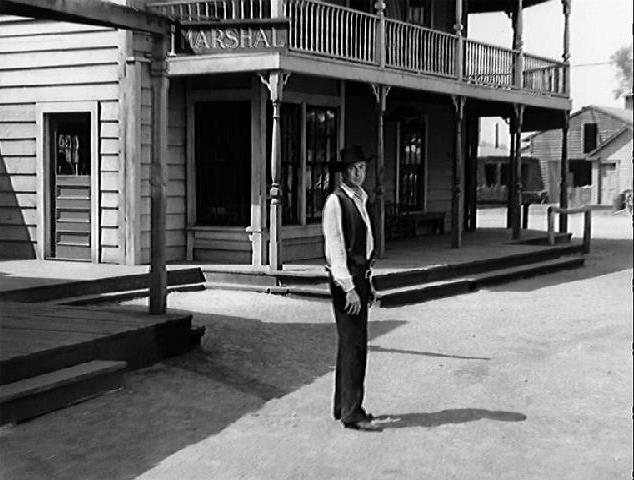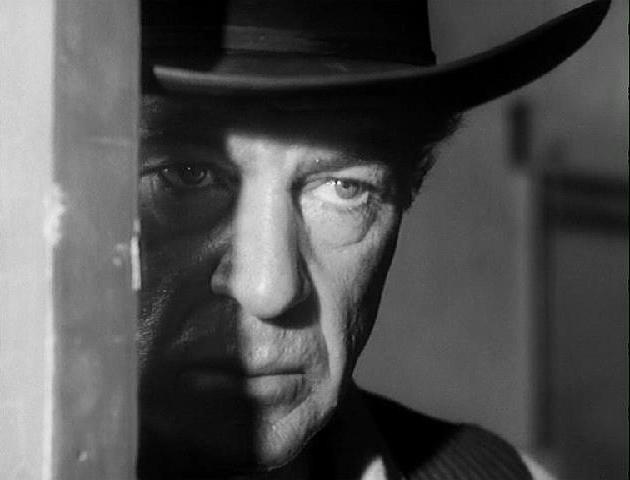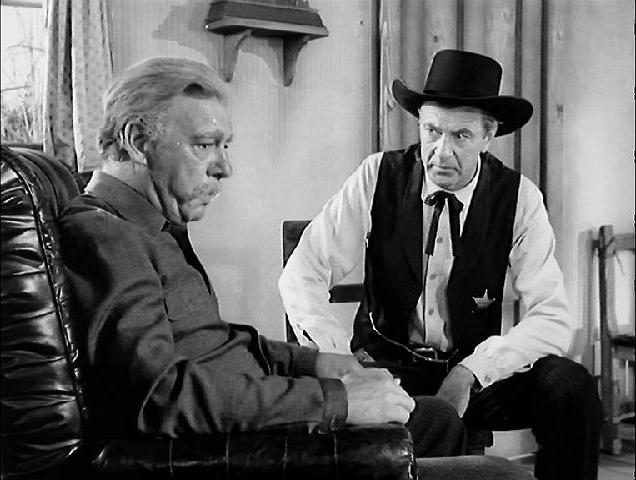 I hadn’t seen High Noon (1952) in years when this showing crossed my path, and I wasn’t all that anxious to renew my acquaintance with it. This, I confess, was in large part due to the presence of director Fred Zinneman. Yes, his work is highly regarded, but it’s always seemed a little stodgy and self-important to me, with a level of strained seriousness that rivals that of Stanley Kramer but with less bombast and fewer bloated running times. To my surprise, I found nothing like that here. Oh, there is at least one problem — Zinneman is not so hot when it comes to action scenes. There is a late-in-the-film fistfight between Gary Cooper and Lloyd Bridges that is both clumsy and awkwardly edited. Overall, however, Zinneman handles High Noon with stylish skill and economy. His work, in fact, is part of what makes the image of Cooper all alone on the empty straight one of the most iconic in film. Better yet, it’s the kind of almost mythical poetry that feels completely uncalculated, even if you assume that it’s done very deliberately.
I hadn’t seen High Noon (1952) in years when this showing crossed my path, and I wasn’t all that anxious to renew my acquaintance with it. This, I confess, was in large part due to the presence of director Fred Zinneman. Yes, his work is highly regarded, but it’s always seemed a little stodgy and self-important to me, with a level of strained seriousness that rivals that of Stanley Kramer but with less bombast and fewer bloated running times. To my surprise, I found nothing like that here. Oh, there is at least one problem — Zinneman is not so hot when it comes to action scenes. There is a late-in-the-film fistfight between Gary Cooper and Lloyd Bridges that is both clumsy and awkwardly edited. Overall, however, Zinneman handles High Noon with stylish skill and economy. His work, in fact, is part of what makes the image of Cooper all alone on the empty straight one of the most iconic in film. Better yet, it’s the kind of almost mythical poetry that feels completely uncalculated, even if you assume that it’s done very deliberately.
The story is as straightforward as they come. Retiring Marshal Will Kane (Cooper) having just married Amy Fowler and hung up his guns, learns that a mentally unstable killer, Frank Miller (Ian MacDonald), is on his way back to town to settle a score with Kane. His gang is already there, and Miller will be arriving on the noon train.
With this in front of him, Kane puts his guns back on and prepares to meet his adversary — something neither his new wife, nor anyone else wants him to do. It isn’t just that Kane thinks this is the right thing to do (though he clearly does), but he also realizes that Miller won’t stop pursuing him — and his family — until this is actually settled. As the story unfolds, it becomes increasingly apparent that Kane is on his own for that high noon showdown with Miller and his three henchman.
It’s all clean and simple. And while it’s pretty much all Cooper’s show, nearly every beautifully cast supporting player — Thomas Mitchell, Grace Kelly, Katy Jurado, Otto Kruger, Lloyd Bridges, even Lon Chaney — gets at least one terrific scene and sometimes more. What’s amazing is that the film constantly avoids falling into any kind of easy sentimentality. What sentiment there is — and there’s not much — is earned, while its spare ending brilliantly eschews any sense of everything being set to rights. (For this we should probably thank the already HUAC blacklisted writer Carl Foreman.) The film’s tight construction is another plus. It covers 82 minutes of time, and it runs 82 minutes. It may not be quite real time (the film definitely makes the last few minutes last longer than they should), but it offers a solid illusion of it. Downsides? Well, apart from the aforementioned fistfight, it does require a tolerance for Tex Ritter singing “Do Not Forsake Me, Oh, My Darling,” which might be easier if you weren’t around when it was immensely popular.
The Hendersonville Film Society will show High Noon Sunday, Apr. 13, at 2 p.m. in the Smoky Mountain Theater at Lake Pointe Landing Retirement Community (behind Epic Cinemas), 333 Thompson St., Hendersonville.






Before you comment
The comments section is here to provide a platform for civil dialogue on the issues we face together as a local community. Xpress is committed to offering this platform for all voices, but when the tone of the discussion gets nasty or strays off topic, we believe many people choose not to participate. Xpress editors are determined to moderate comments to ensure a constructive interchange is maintained. All comments judged not to be in keeping with the spirit of civil discourse will be removed and repeat violators will be banned. See here for our terms of service. Thank you for being part of this effort to promote respectful discussion.